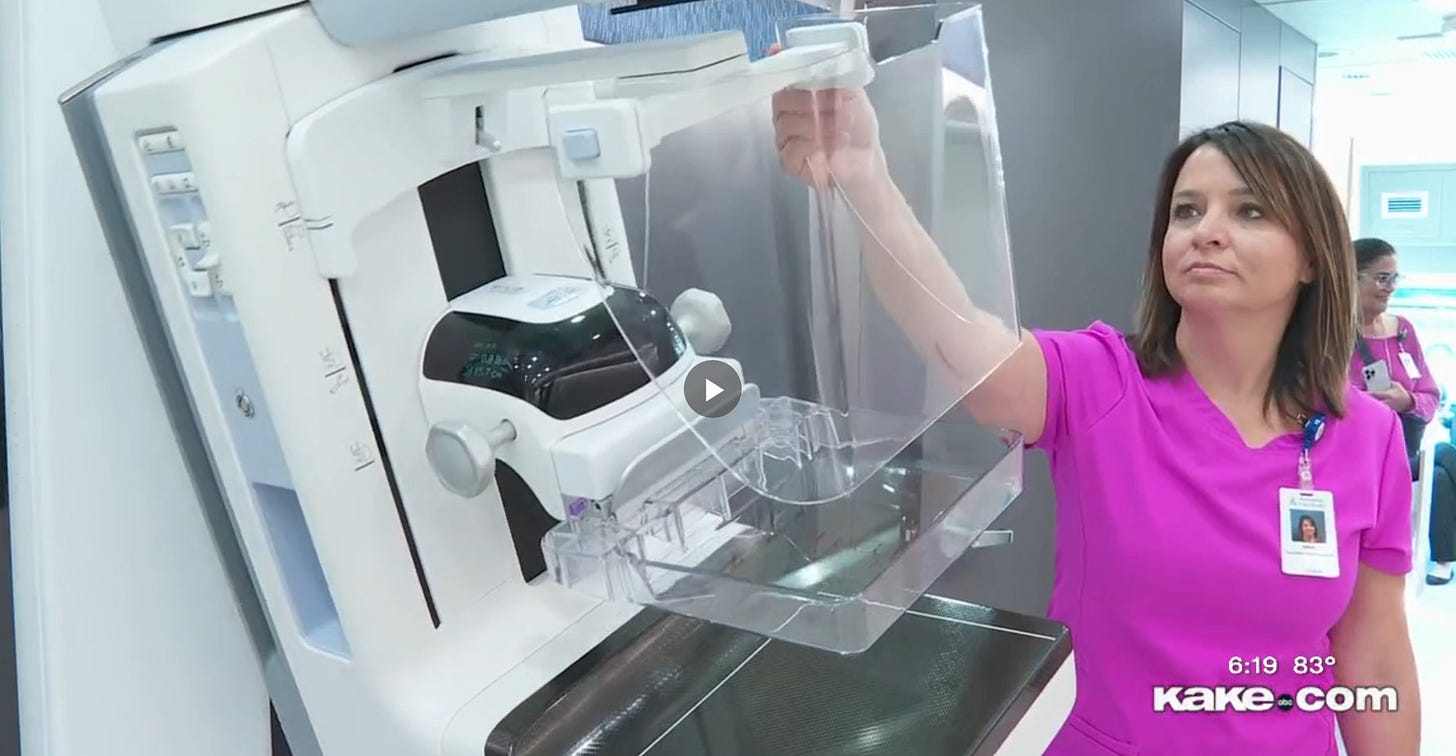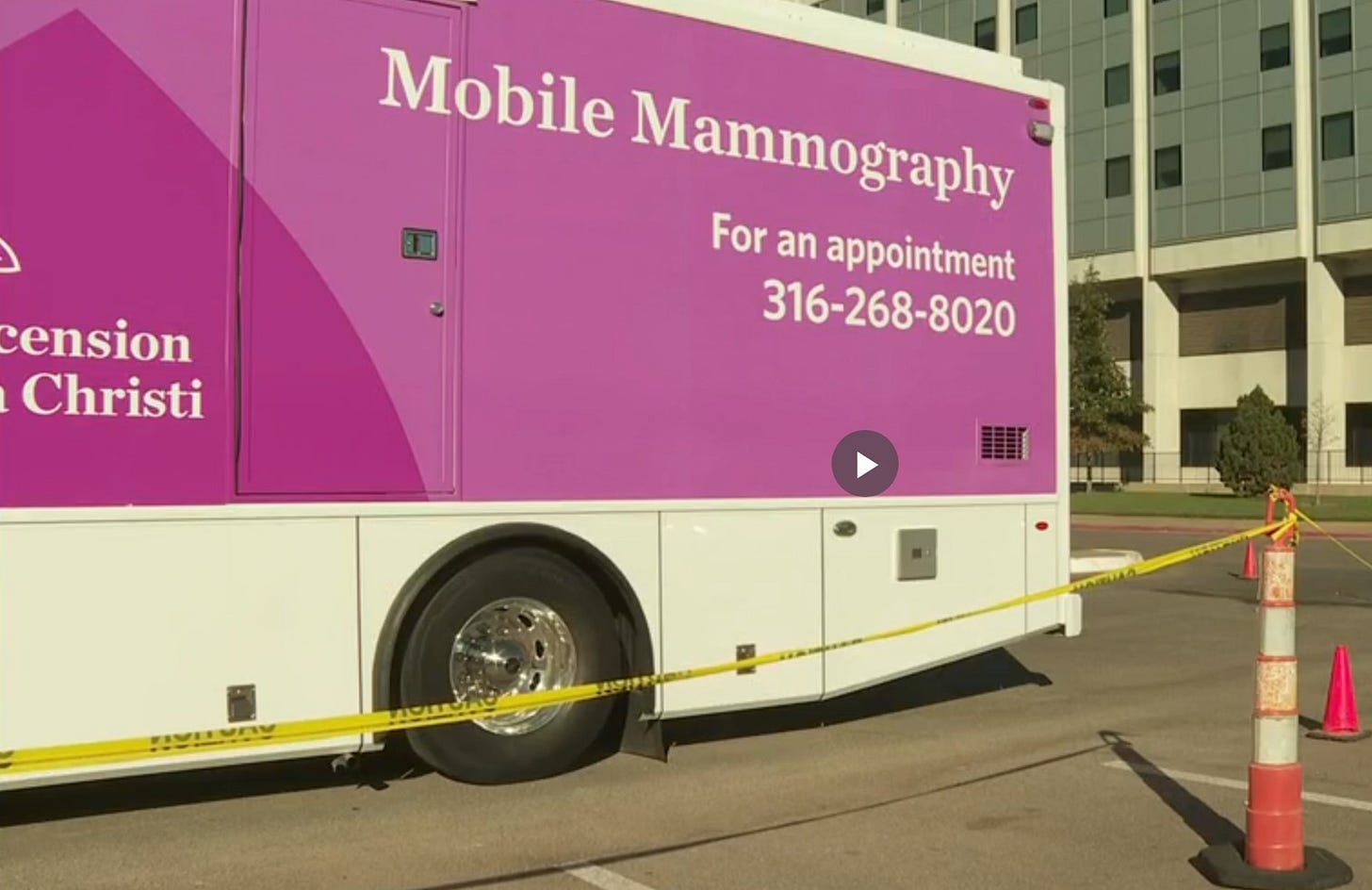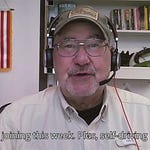January 15, 2024
Once a month I am privileged to attend a meeting of the Patient Advisory Board at the local hospital. This small group includes hospital staff and patients (ex-patients) who focus on improving the patient experience.
After spending most of my summer as an inmate (inpatient) in 2022, and having walked out under my own power, I was deemed a likely suspect to join the group.
(No good deed shall go unpunished.)
A recent presentation was on their new mobile mammography van, made available in various smaller communities where cancer screenings are less accessible.
Don’t worry… we’ll get to the B-29 story in a sec.
For a tough guy like myself, I have to paste a plastic smile on my face and try to avoid obvious squirming during the discussion. The last thing I really want to talk about is a mammogram.
Be that as it may, the opportunity for a cancer screening, usually at zero cost once insurance and grants are figured in, is a life-saver. For a measurable percentage of the population it is an actual life-saver.
I discussed this briefly with a woman at one of my book-signings recently. She appeared to be about my age; she inquired about my connection with the hospital, and I mentioned the Advisory Board and the mammography van.
She visibly winced, and confessed she had never been screened for breast cancer.
“It’s too scary,” she said. “I have friends who have had breast cancer and I’m afraid of getting the report.” She scowled. “I’d rather not know.”
I could identify with the sentiment, and was fairly impressed with her honesty.
The fact remains, however, that about 2 million Americans will hear a new cancer diagnosis sometime this year. Some people you know probably already have heard it, even though we are barely two weeks into the year.
You are not yet aware of their diagnosis. Try not to be shocked when the news breaks.
Being unwilling to face up to the possibility of cancer in your own body means you are unwilling to accept an early intervention.
Early interventions are much more common now than even 10 years ago.
Early interventions improve survival rates enormously.
Early interventions mean better quality of life, for both you and your family.
We always face potential disasters; that’s what life is.
A disaster far away looms like a dark cloud. Once it gets close, however, we almost always find it is not as bad as we suspected.
Which brings us to the B-29.
Delbert, some 30 years older than I, served as a navigator-bombardier on a B-29 Superfortress bomber in WW2. His unit made regular bombing runs over the Japanese home islands from a base on Saipan.
Until U.S. forces reached Saipan in June 1944, direct bombing of Japan was not possible. The Saipan base put bombers within 1,500 miles of the targets, well within the 5,000-mile round-trip range of the B-29 four-engine bombers.
The Superfortresses were susceptible to enemy fighter attacks. Japanese forces by this point in the war had been reduced, but the threat remained measurable.
To offer mutual protection from Japanese fighter planes, the squadrons of B-29s, over 100 in each attack wing, maintained close formation during their flights.
Each bomber not only carried 2,000 lbs in a bomb load, but its crew of 11 manned 7 mounted machine guns for close air-to-air defense. (Much like the door guns on the Millenium Falcon in the original Star Wars movie. “Don’t get cocky, kid!”)
For a single bomber to become separated from this defensive flying formation was to put it in severe jeopardy of a lone attack. A single B-29 was no match for a fast, highly maneuverable fighter.
All of which meant that the Superforts clustered close together in the sky, and nobody deviated from that flight plan.
Straight and level. Unvarying and predictable.
Ground-based Japanese anti-aircraft personnel knew this, of course. They also knew the probable routes the bombers would take. They trained their guns into the sky and waited for the Americans to arrive.
When I asked Delbert of this in about 1985, he shared freely. As best I recall, here is our conversation:
Delbert: “They put up flak (anti-aircraft fire) into a box in the sky, a big cube a mile high, a mile wide and a mile deep. The box was at about 30,000 feet, the altitude they knew we had to fly.”
“Could you see it when you got close?” I asked.
“Oh, yes,” Delbert said. “I was the bombardier, and I sat in the very nose of the airplane, on a seat cantilevered out in front of everything else. There was nothing around me but plexiglass above, below, and on both sides.”
The plexiglass allowed maximum visibility. The pilot and co-pilot were above him, slightly behind, to the left and right.
In the nose of the aircraft, Delbert was all by himself alone.
“We could see that flak coming from a few miles away. They put up enough ammunition to fill that box in the air. When the shells reached their zenith, they would explode, like the star shells you see at the Fourth of July.”
“And that would kill a B-29?”
“A direct hit would, yes, and even one close would shower the plane with shrapnel. The fragments penetrated the fuselage and bounced around on the inside. Every piece was like a bullet.”
“Scary,” I said.
“Yes, but the shells that burst at your own altitude were fairly harmless. Because they were gaining altitude as they came up, when they exploded the shrapnel would continue to rise and we would fly under it.” His face clouded. “But when you see that the shells are bursting a few hundred feet below your altitude… you get a little more concerned.”
“So, you were scared going in that flak box.”
“Yes, but there was not a blessed thing we could do about it. Obviously, only the pilot could change course, and he absolutely would not, for fear of running into another plane just off our wingtip.” He shrugged. “The only thing we could do was fly right through it.”
“Again, scary,” I prompted.
“Yes, but listen.” He looked me in the eye. “You get into box of flak, which looks so bad from 5 miles away, and once you’re inside, you realize there is lots of room between those rounds coming up. It’s just a matter of luck if they hit you.”
He shrugged again, almost dismissively. “The threat covers a huge area. The sky is a big place.”
We may never see a generation like that again.
Delbert’s statement has stuck with me for 40 years, and has helped me think objectively about potential threats: “The sky is a big place.”
Problems look bad from far away, and maybe they ARE bad. It would be good to avoid them and simply fly around them, but that is not always possible.
A problem is usually not defeated by ignoring it.
So get the cancer screening. See if there is a problem, and if so, get help to fix it.
Louis L’Amour’s hero was asked: “What would you do, Marshall, if the bank robbers came to town?”
“Well, Ed,” drawled the lawman laconically, “I’d just have to take steps, is all.” (The Marshall of Sentinel.)
Isaiah 37:14 Hezekiah received the letter from the messengers and read it. Then he went up to the temple of the Lord and spread it out before the Lord.
When Hezekiah heard of the invading army he did not ignore the threat. He pursued the only logical option available: He accepted the bad news, took it to the Temple and prayed for God’s protection.
I would remind you that the Cancer Unit at Ascension St. Francis Hospital in Wichita, Kansas, is a full-service cancer treatment facility. My rough estimation is that they can host about 24 patients at a time. If each remains for a month, that’s 288 people per year.
Each family potentially needs a copy of Alligator Wrestling in the Cancer Ward, with its message of hope and optimism. A dozen copies each month could be used to good effect.
If you are so led, I would ask you to do what you can to provide complimentary copies to patients and caregivers. Order them through Via Christi Foundation for a tax-deductible contribution.
Find the order page at www.alligatorpublishing.com/via-christi. Your help is greatly appreciated.
And… consider your cancer screening. If you are in the area, contact your physician, or St. Francis directly for information. https://healthcare.ascension.org/specialty-care/cancer



















Share this post